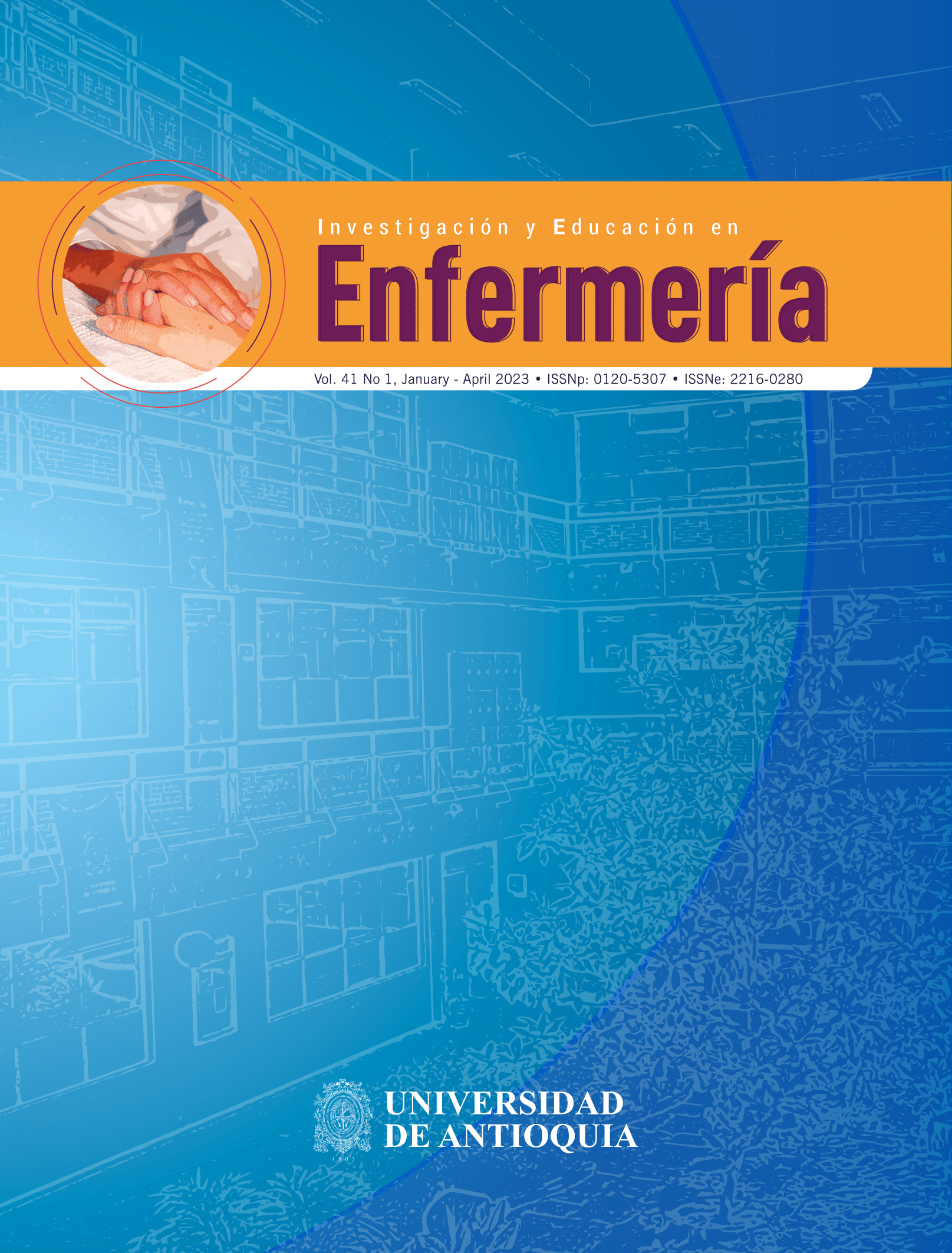Right to health and encouragement of social participation in elementary education
DOI:
https://doi.org/10.17533/udea.iee.v41n1e08Keywords:
health promotion, education, primary and secondary, simulation training, health councils, empowerment, adolescentAbstract
Objective Develop and validate an ordinary meeting simulation template of the Municipal Health Council applied to students of cycle II of Elementary School.
Methods. Qualitative and descriptive research developed in two phases: construction of simulation scenario of ordinary meeting of the Municipal Health Council and validation by committee of experts who analyzed the representativeness and adequacy of the content. The scenario included the items: prebriefing, additional information about the case, scenario objectives, evaluation criteria (observers), scenario duration time, human and physical resources, instructions for the actors, context, references and debriefing. In order to be able to understand which items should be modified according to the evaluations of the experts, it was used as criterion that only items that had 80% or higher percentage of agreement between the experts for modification would be modified.
Results: There was agreement to modify the prebriefing in: additional information about the case (100%); learning objectives (88.8%); human and physical resources (88.8%); context (88.8%); and in the debriefing (88.8%). The prebriefing did not reach the level of agreement: evaluation criteria (66.6%), duration of the scenario (77.7%), instruction for authors (77.7%), references (77.7%), which were modified.
Conclusion. With the template developed and then validated by the committee of experts, it will be possible to develop in the classroom content related to the right to health and social participation in the scope of elementary education, as well as encourage engagement in important bodies for the maintenance of democracy, justice and social equity.
Downloads
References
1. Brasil. Ministério da Saúde. Gabinete do Ministro. Portaria Nº 2.446 de 11 de novembro de 2014. Redefine a Política Nacional de Promoção da Saúde da Saúde (PNPS). Diário Oficial da União, 11 Nov 2014 [Cited 24 Abr 2022]. Available from: https://bvsms.saude.gov.br/bvs/saudelegis/gm/2014/prt2446_11_11_2014.html
2. Brasil. Presidência da República. Casa Civil. Decreto Nº 6.286, de 5 de dezembro de 2007. Institui o Programa Saúde na Escola (PSE), e dá outras providências. Diário Oficial da União, 5 Dez 2007 [Cited 24 Abr 2022]. Available from: http://www.planalto.gov.br/ccivil_03/_ato2007-2010/2007/decreto/d6286.htm
3. Coelho JS. Building social participation on the Brazilian Health System: a constant rethinking that seeks fairness and transformation. Saúde Soc. 2012; 21(1):138-51.
4. Toro JBT, Werneck NMDF. Mobilização Social - um modo de construir a democracia e a participação. Belo Horizonte: Autêntica; 2004.
5. Organização Mundial da Saúde. Diminuindo diferenças: a prática das políticas sobre determinantes sociais da saúde. In: OMS. Todos pela equidade: Conferência Mundial sobre Determinantes Sociais da Saúde; 2011 Out 19-21; Rio de Janeiro, Brasil.
6. Fuginami CN, Colussi CF, Ortiga AMB. Analysis of management tools elaborated by the Municipal Health Departments of Santa Catarina from 204 to 2017. Saúde Debate. 2020; 44(126):857-70.
7. Porto RS. Protagonismo Juvenil e Promoção da Saúde: uma revisão da literatura [dissertação]. Escola Nacional de Saúde Pública Sérgio Arouca: Fundação Oswaldo Cruz; 2019.
8. Ventura CAA, Miwa MJ, Serapioni M, Jorge MS. Participatory culture: citizenship-building process in Brazil. Interface (Botucatu). 2017]; 21(63):907-20.
9. Fabri RP. Construção de roteiro-prático para atividade simulada [Dissertação]. Escola de Enfermagem de Ribeirão Preto: Universidade de São Paulo; 2015.
10. Polit DF, Beck CT. The content validity index: are you sure you know what’s being reported? Critique and recommendations. Res. Nurs. Health. 2006; 29(5):489-97.
11. Pasquali L. Principles of elaboration of psychological scales. Rev. Psiquiatr. Clín. 1998; 25(5):206-13.
12. Tilden VP, Nelson CA, May BA. Use of qualitative methods to enhance content validity. Nurs. Res. 1990; 39(3):172-5.
13. Topf M. Three estimates of interrater reliability for nominal data. Nurs. Res. 1986; 35(4):253-5.
14. Freire P. Pedagogia da autonomia – saberes necessários à prática educativa. 68º edição. São Paulo: Paz e Terra; 1996.
15. Libâneo JC. Os métodos de ensino. In: Libâne JC. Didática. 2º edição. São Paulo: Cortez Editora; 2013. Pág. 149-75.
16. Luckesi CC. Verificação ou Avaliação: o que pratica a escola? In: Luckesi CC. Avaliação da Aprendizagem Escolar. 9º edição. São Paulo: Cortez Editora; 1999. Pág. 85-101.
17. Luckesi CC. Avaliação da aprendizagem escolar: um ato amoroso. In: Luckesi CC. Avaliação da aprendizagem escolar: estudos e proposições. 9º edição. São Paulo: Cortez Editora; 1999. pág. 168-80.
18. Munroe B, Buckley T, Curtis K, Morris R. Designing and implementing simulation as a research tool. Austral. Emerg. Nurs. J. 2016; 19:90-105.
19. Freire P. Pedagogia do oprimido. 69º edição. São Paulo: Paz e Terra, 2019.
20. Pereira FI. Aprendizagem por pares e os desafios da educação para o senso-crítico. Int. J. Activ. Learn. 2017; 2(1):6-12.
21. Dewey J. Democracia e Educação. São Paulo: Companhia Editora Nacional, 1979.
Downloads
Published
Versions
- 2023-09-20 (3)
- 2023-08-23 (2)
- 2023-03-14 (1)
How to Cite
Issue
Section
License
Copyright (c) 2023 Investigación y Educación en Enfermería

This work is licensed under a Creative Commons Attribution-NonCommercial-ShareAlike 4.0 International License.
Derechos de propiedad / Direitos de Propriedade
English: If the article is accepted for publication, all copyright will be of exclusive property of Investigación y Educación en Enfermería. The text and the graphics included in the publication are exclusive responsibility of the authors and not necessarily reflect the thought of the Editorial Committee.
Español: Si el artículo es aprobado para publicación, todos los derechos son de propiedad de Investigación y Educación en Enfermería. El texto y las gráficas incluidas en la publicación son de exclusiva responsabilidad de los autores y no necesariamente refleja el pensamiento del Comité Editorial.
Português: Se o artigo for aceito para publicação, todos os direitos autorais serão de propriedade exclusiva de Investigación y Educación en Enfermería. O texto e os gráficos incluídos na publicação são de responsabilidade exclusiva dos autores e não refletem necessariamente o pensamento do Comitê Editorial.















